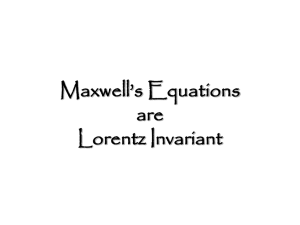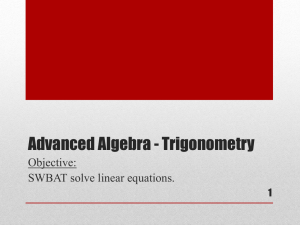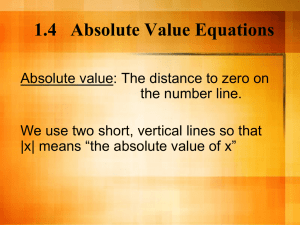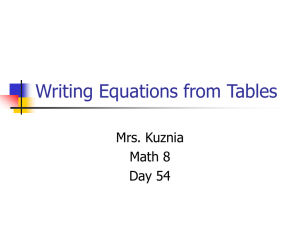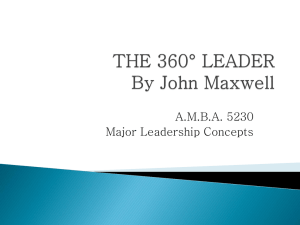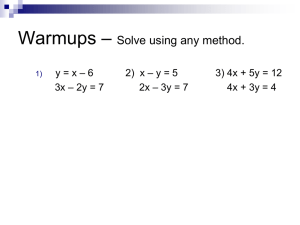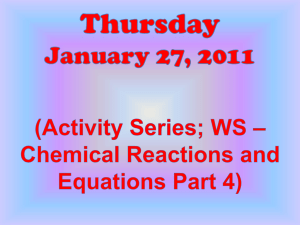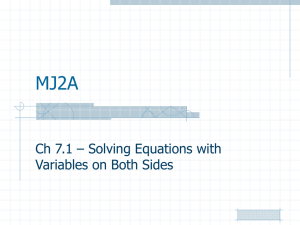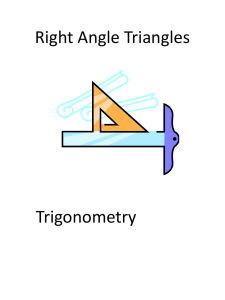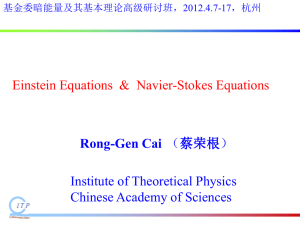The Unification of Gravity and E&M via Kaluza Klein
advertisement
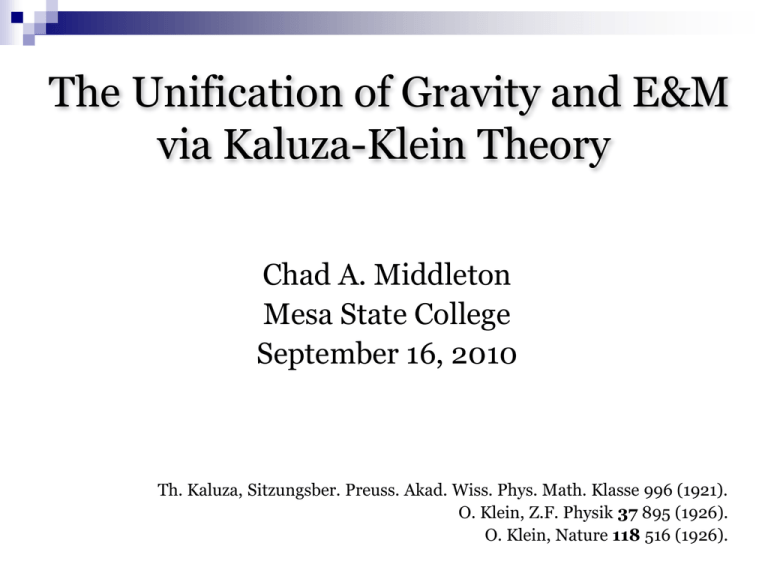
The Unification of Gravity and E&M via Kaluza-Klein Theory Chad A. Middleton Mesa State College September 16, 2010 Th. Kaluza, Sitzungsber. Preuss. Akad. Wiss. Phys. Math. Klasse 996 (1921). O. Klein, Z.F. Physik 37 895 (1926). O. Klein, Nature 118 516 (1926). Outline… Electromagnetic Theory Differential form of the Maxwell equations Scalar and vector potentials in E&M Maxwell’s equations in terms of the potentials Relativistic form of the Maxwell equations Intro to Einstein’s General Relativity Kaluza-Klein metric ansatz in 5D Einstein field equations in 5D Maxwell’s equations in differential form (in vacuum) E 0 Gauss’ Law for E-field B 0 Gauss’ Law for B-field B E 0 t E B 00 0 J t these plus F q E v B Faraday’s Law Ampere’s Law with Maxwell’s Correction the Lorentz force completely describe classical Electromagnetic Theory Taking the curl of the 3rd & 4th eqns (in free space when = J = 0) yield.. 2 1 2 2 2 E 0 c t 2 1 2 2 2 B 0 c t The wave equations for the E-, B-fields with predicted wave speed c 1 00 3.0 108 m /s Light = EM wave! Notice the similarity between the treatment of space & time. Maxwell’s equations… E 0 Gauss’ Law for E-field B 0 Gauss’ Law for B-field B E 0 t E B 00 0 J t Faraday’s Law Ampere’s Law with Maxwell’s Correction Q: Can we write the Maxwell eqns in terms of potentials? E, B in terms of A, Φ… B A A E t Φ is called the Scalar Potential A is called the Vector Potential Write the Maxwell equations in terms of the potentials. Maxwell’s equations in terms of the Scalar & Vector Potentials A t 0 2 Gauss’ Law 2 2 A A A 00 2 00 0 J t t Ampere’s Law Gauge Invariance of A, Φ.. B A A E t Notice: are invariant under the transformations: E & B fields t for any function A A A Show gauge invariance of E & B. (r ,t) Introducing 4-vector calculus.. Define the 4-vector potential, Aα, as… A (A0, A) /c, A Define the 4-vector current density, Jα, as… J (J ,J ) c,J 0 Define the 4-vector operator… 1 1 0 (0 ,) , & ( ,) , c t c t Relativistic form of the Maxwell Eqns.. F where 0J F A A is called the EM field-strength tensor. Notice: The gauge invariance of the 4-vector potential becomes A A A (x ) Calculate β=0 component of the Maxwell equation In 1915, Einstein gives the world his General Theory of Relativity G 8GT G describes the curvature of spacetime T describes the matter & energy in spacetime When forced to summarize the general theory of relativity in one sentence; time and space and gravity have no separate existence from matter - Albert Einstein Matter tells space how to curve Space tells matter how to move Line element in 4D curved spacetime ds g dx dx 2 g is the metric tensor g defines the geometry of spacetime Know g , know geometry i.e. In flat space: ds c dt dx dy dz 2 2 2 2 2 2 Assumptions of Kaluza… 1. Nature = pure gravity 2. Mathematics of 4D GR can be extended to 5D 3. No dependence on the 5th coordinate Assumptions of Kaluza… 1. Nature = pure gravity 2. Mathematics of 4D GR can be extended to 5D 3. No dependence on the 5th coordinate O. Klein discovers a way to drop this assumption. GR in 5D.. The 5D metric tensor can be expressed as.. gˆ AB gˆ gˆ 5 gˆ 5 gˆ 55 Notice: • from a 4D viewpoint, these are a tensor, a vector, and a scalar • where the indicies range over the values A,B 0,1,2,3,5 & , 0,1,2,3 GR in 5D.. Parameterize the 5D metric tensor as.. gˆ AB g 2 A A A A A A (x ) g g (x ) where , Notice: Aα is a 4-vector. Q: Is Aα the 4-vector potential? 1 GR in 5D.. Parameterize the 5D metric tensor as.. gˆ AB g 2 A A A A 1 A A (x ) g g (x ) where , Notice: Aα is a 4-vector. Q: Is Aα the 4-vector potential? the Maxwell Equations! A: Only if it satisfies This metric ansatz yields the 5D line element.. ds g dx dx (A dx dy) 2 2 Notice: The line element is invariant under translations in y: y y y (x ) A A A (x ) According to Kaluza-Klein theory: invariance arises from translational invariance in y! Gauge Plugging our metric ansatz into the 5D GR eqns yields.. 1 2 EM G T 2 F 0 where T EM 1 g F F F F 4 Plugging our metric ansatz into the 5D GR eqns yields.. 1 2 EM G T 2 F 0 The 4D Einstein equations with matter (radiation) from Einstein eqns in 5D w/out matter! where T EM 1 g F F F F 4 Plugging our metric ansatz into the 5D GR eqns yields.. 1 2 EM G T 2 F 0 The Maxwell equations in 4D in the absence of a current! where T EM 1 g F F F F 4 Plugging our metric ansatz into the 5D GR eqns yield.. 1 2 EM G T 2 F 0 The 4D EM stress-energy tensor! where T EM 1 g F F F F 4 Conclusions According to Kaluza-Klein theory: 5D Einstein equations in vacuum induce 4D Einstein equations with matter (EM radiation) Electromagnetic theory is a product of pure geometry Gauge invariance arises from translational invariance in the extra dimension. Shortcomings: 5th dimension is not observed! Why does the metric tensor & the vector potential not depend on the 5th dimension? Kaluza-Klein Compactification Consider a 5D theory, w/ the 5th dimension periodic… y y 2R http://images.iop.org/objects/physicsweb/world/13/11/9/pw1311091.gif 1 F A A where R R F F 4 A' A (5) (4) •Kaluza, Theodor (1921) Akad. Wiss. Berlin. Math. Phys. 1921: 966–972 •Klein, Oskar (1926) Zeitschrift für Physik, 37 (12): 895–906 The Maxwell & GR equations of are derivable from an action, just like the Lagrange eqns. Classical Dynamics: L d L Ldt 0 0 x dt xÝ Electromagnetic Theory: 1 4 F F 0 A J d x 0 F 0 J 4 General Relativity: gR d x 0 G 8GT (4) 4
